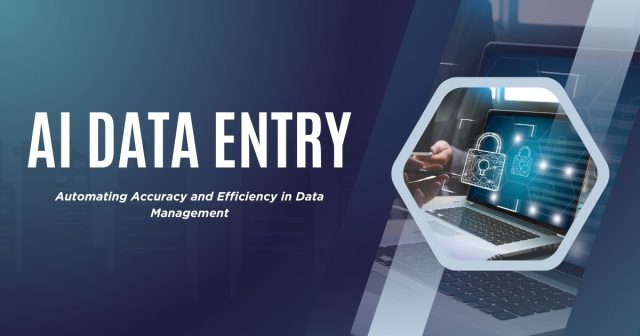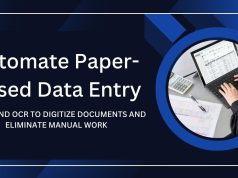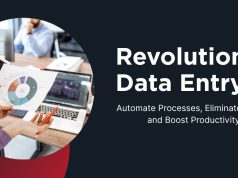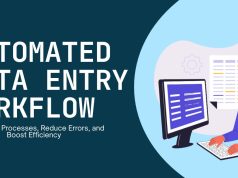Customer relationship management has always been the backbone of successful businesses, but manual data entry continues to plague sales teams worldwide. Hours spent updating contact information, logging call notes, and tracking customer interactions drain productivity and create opportunities for human error. The solution lies in artificial intelligence transforming how businesses handle CRM data entry automation.
Modern AI-powered systems can automatically capture, process, and organize customer information with remarkable accuracy. These intelligent tools eliminate the tedious manual work that keeps sales professionals from focusing on what matters most: building relationships and closing deals. By integrating AI data entry capabilities into existing CRM platforms, companies are seeing dramatic improvements in data quality, team efficiency, and overall sales performance.
The shift toward automated data management represents more than just a technological upgrade. It’s a fundamental change in how businesses approach customer relationship management, offering unprecedented opportunities to scale operations while maintaining personalized service standards.
Understanding CRM Automation AI Data Entry

CRM automation AI data entry refers to intelligent systems that automatically collect, process, and input customer information into CRM platforms without human intervention. These sophisticated tools use machine learning algorithms, natural language processing, and optical character recognition to extract relevant data from various sources including emails, business cards, phone calls, and web forms.
Traditional data entry requires sales representatives to manually input every piece of customer information, often leading to incomplete records, typos, and inconsistent formatting. AI-powered systems eliminate these issues by standardizing data formats, validating information accuracy, and ensuring comprehensive record keeping across all customer touchpoints.
The technology works by analyzing incoming data streams and identifying key information patterns. When a new email arrives or a business card gets scanned, the AI system extracts relevant details like names, phone numbers, company information, and interaction history, then automatically populates the appropriate CRM fields.
Key Benefits of AI-Powered CRM Data Entry
Enhanced Data Accuracy and Consistency
Manual data entry inevitably leads to errors, inconsistencies, and incomplete records. AI systems maintain consistent formatting standards and validate information against existing databases to ensure accuracy. These intelligent tools can detect duplicate entries, correct common mistakes, and flag potentially inaccurate information for review.
Research shows that poor data quality costs businesses an average of $15 million annually. AI-powered data entry significantly reduces these costs by maintaining clean, accurate customer databases that support better decision-making and more effective sales strategies.
Dramatic Time Savings for Sales Teams
Sales professionals spend approximately 21% of their time on data entry and administrative tasks rather than selling activities. CRM automation AI data entry can reduce this burden by up to 80%, freeing valuable time for relationship building and revenue generation. Many businesses also benefit from automated data entry workflows to further optimize efficiency.
The time savings compound across entire organizations. A sales team of ten representatives can collectively save 40+ hours weekly by implementing AI data entry solutions, translating directly into increased selling capacity and improved quota achievement.
Improved Lead Response Times
Speed matters in sales, with companies responding to leads within five minutes being 100 times more likely to make contact than those waiting 30 minutes. AI data entry systems process incoming leads instantly, automatically creating records and triggering appropriate follow-up workflows without delays caused by manual processing.
This immediate data processing enables sales teams to respond faster, while automated lead scoring and routing ensure the right representatives connect with prospects at optimal moments.
Better Customer Insights and Analytics
Complete, accurate data enables more sophisticated customer analytics and insights. AI systems can identify patterns in customer behavior, predict buying intentions, and recommend personalized engagement strategies based on comprehensive interaction histories. Combining this with AI data entry automation guides ensures maximum business intelligence.
These enhanced insights support more targeted marketing campaigns, improved customer segmentation, and data-driven sales forecasting that drives better business outcomes.
Popular AI Data Entry Solutions for CRM

Salesforce Einstein
Salesforce Einstein offers comprehensive AI capabilities including automated data capture, lead scoring, and predictive analytics. The platform integrates seamlessly with existing Salesforce environments, providing intelligent recommendations and automating routine data management tasks.
Einstein’s machine learning algorithms continuously improve data quality by learning from user corrections and identifying patterns in customer information. The system can automatically populate contact records from email signatures, social media profiles, and public databases.
HubSpot’s AI-Powered Features
HubSpot incorporates AI throughout its CRM platform, offering automated contact creation, intelligent lead scoring, and predictive analytics. The system automatically captures website visitor information, creates contact records from form submissions, and tracks customer interactions across multiple channels.
HubSpot’s AI tools also provide conversation intelligence, analyzing sales calls to extract key information and automatically updating CRM records with meeting notes and follow-up tasks.
Microsoft Dynamics 365 AI
Microsoft Dynamics 365 leverages Azure AI services to provide intelligent data entry, customer insights, and sales forecasting capabilities. The platform offers relationship assistant features that automatically surface relevant customer information and suggest next-best actions.
The system integrates with Microsoft’s broader ecosystem, automatically capturing customer interactions from Outlook, Teams, and other Office 365 applications to maintain comprehensive customer profiles.
Pipedrive’s AI Sales Assistant
Pipedrive’s AI Sales Assistant automates data entry tasks while providing intelligent recommendations for sales activities. The system can automatically create deals from emails, extract contact information from various sources, and suggest optimal follow-up timing based on customer behavior patterns.
Implementation Best Practices

Start with Clean Data Foundation
Before implementing AI data entry solutions, audit and clean existing CRM data. Remove duplicates, standardize formatting, and fill gaps in customer records. AI systems perform better when working with high-quality foundational data.
Establish clear data governance policies that define required fields, naming conventions, and data quality standards. These guidelines help AI systems maintain consistency and accuracy over time.
Choose the Right Integration Approach

Evaluate whether to implement standalone AI tools or use built-in CRM features. Consider API capabilities, data security, and scalability. For developers, automating data entry with JavaScript can provide custom solutions.
Consider API capabilities, data security requirements, and scalability needs when selecting AI data entry solutions. Ensure chosen platforms can grow with business requirements and integrate with other essential tools.
Train Teams on AI-Assisted Workflows
Success depends on user adoption and proper utilization of AI capabilities. Provide comprehensive training that demonstrates how AI data entry saves time while improving data quality. Show sales teams how to review AI-generated entries and make corrections that improve system accuracy.
Establish feedback loops that allow AI systems to learn from user corrections and preferences. Regular training sessions help teams maximize AI tool benefits while maintaining data quality standards.
Monitor Performance and ROI
Track key metrics including data entry time savings, data accuracy improvements, and sales team productivity gains. Monitor lead response times, data completeness scores, and user adoption rates to measure implementation success.
Regular performance reviews help identify optimization opportunities and ensure AI systems continue delivering expected benefits as business needs evolve.
Overcoming Common Implementation Challenges
Data Privacy and Security Concerns
AI data entry systems must comply with data protection regulations like GDPR and CCPA. Implement proper access controls, data encryption, and audit trails to protect customer information. Choose vendors with strong security credentials and transparent data handling practices.
Regular security assessments ensure AI systems maintain appropriate protection levels as they process increasing volumes of customer data.
Integration Complexity
Complex CRM environments may require custom integrations or specialized configuration to properly implement AI data entry capabilities. Work with experienced implementation partners who understand both AI technologies and CRM platform requirements.
Plan for potential data migration challenges and establish testing protocols that validate AI system accuracy before full deployment.
User Resistance to Change
Some team members may resist AI-powered changes to established workflows. Address concerns through clear communication about AI benefits, comprehensive training programs, and gradual rollout approaches that allow teams to adapt progressively.
Highlight success stories and measurable improvements to build confidence in AI capabilities while maintaining transparency about system limitations.
Future Trends in CRM AI Automation
Advanced Natural Language Processing
Future AI data entry systems will leverage advanced NLP to understand conversational context, sentiment, and intent. For marketers, pairing AI CRM with AI and machine learning analytics can enhance predictive customer engagement strategies.
For example, if a customer writes, “I’m considering upgrading my plan next month but have some concerns about support response times,” an NLP-powered system can automatically flag this as a potential upsell opportunity while noting a concern that may require proactive follow-up. By understanding subtle cues in customer communications, AI can categorize interactions, prioritize follow-ups, and even suggest next-best actions for sales teams.
This level of sophistication reduces the risk of human oversight, ensures critical insights are captured, and enables more strategic, personalized customer engagement at scale. It also allows organizations to analyze trends in customer sentiment and behavior over time, providing valuable feedback for product, marketing, and support teams.
Predictive Data Enhancement
Predictive data enhancement takes AI data entry beyond simply capturing existing information—it actively anticipates missing or incomplete data and fills in the gaps. By analyzing historical customer interactions, behavioral patterns, and industry benchmarks, AI can predict details such as job titles, company size, geographic location, or purchasing preferences even when this information isn’t explicitly provided.
For instance, if a prospect submits a form with only basic contact details, AI can enrich the profile with likely demographic and behavioral attributes, creating a more complete and actionable record. This predictive capability ensures that sales and marketing teams always work with the most comprehensive dataset possible, improving segmentation, personalization, and targeting efforts.
Additionally, predictive enhancement can detect anomalies or inconsistencies in existing records, prompting automated corrections or alerts for review. The result is a CRM database that is continuously self-improving, highly accurate, and ready for advanced analytics, forecasting, and strategic decision-making.
Voice-Activated Data Entry
Voice-activated data entry represents the next frontier in CRM automation, enabling hands-free updates to customer records. Using cutting-edge speech recognition and AI-driven context understanding, sales professionals can update CRM systems in real time simply by speaking.
For example, after a client call, a salesperson could say, “Log meeting notes, update the client’s interest level to high, and schedule a follow-up for next Thursday,” and the system would accurately record all information in the appropriate fields without manual typing. This not only saves time but also ensures that information is captured immediately, reducing the likelihood of forgotten details or transcription errors.
Voice-activated systems can also integrate with other AI capabilities, such as NLP, to summarize conversations, highlight key action items, and even suggest next steps. This allows sales teams to focus entirely on relationship building and decision-making while maintaining a fully up-to-date, accurate CRM database.
Maximizing Your CRM’s Potential with AI
CRM automation AI data entry transforms how businesses manage customer relationships by eliminating manual data processing burdens while improving information accuracy and accessibility. Organizations implementing these intelligent systems see immediate productivity gains, better customer insights, and more effective sales operations.
The key to success lies in choosing appropriate AI solutions that align with existing CRM platforms and business processes. Start with clear data quality foundations, provide proper team training, and monitor performance metrics to ensure optimal results.
As AI technologies continue advancing, early adopters will gain competitive advantages through more efficient customer relationship management and data-driven sales strategies. The question isn’t whether to implement AI data entry automation, but how quickly your organization can harness these powerful capabilities to drive growth.
Frequently Asked Questions (FAQ)
What types of CRM data can AI handle automatically?
AI can process a wide range of data, including contact information, emails, phone call notes, website form submissions, social media interactions, and transaction history. Advanced systems can also extract context from unstructured data like meeting transcripts and chat logs.
How secure is AI data entry in CRM systems?
Modern AI CRM solutions comply with global data protection regulations like GDPR and CCPA. They use encryption, access controls, and audit logs to protect sensitive customer information while maintaining compliance and transparency.
Can small businesses benefit from AI-powered CRM automation?
Absolutely. Even small teams can use AI to reduce administrative overhead, improve data accuracy, and gain insights that were previously only accessible to larger organizations with dedicated data teams. Many AI CRM features are scalable and cost-effective for smaller setups.
Does AI replace human sales teams?
No, AI augments human efforts rather than replacing them. It handles repetitive, time-consuming tasks like data entry, allowing sales professionals to focus on relationship-building, strategy, and complex problem-solving that require human judgment.
How do I measure ROI from AI CRM data entry?
ROI can be measured by tracking time saved on manual tasks, reduction in data errors, improved lead response times, increased sales productivity, higher conversion rates, and more accurate forecasting. Dashboard reports and analytics tools help quantify these benefits over time.
Is AI data entry difficult to integrate with existing CRMs?
Integration complexity varies by platform. Most major CRM solutions like Salesforce, HubSpot, and Dynamics 365 offer native AI features or APIs for seamless integration. Proper planning, testing, and training ensure smooth adoption and minimal workflow disruption.










